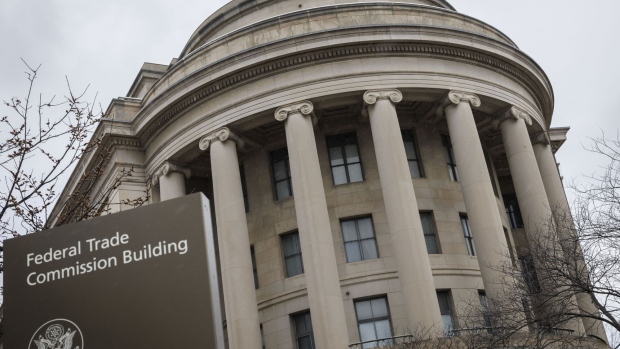Apr 10, 2024
FTC Asks Congress for Authority to Try Its Own Consumer Cases
, Bloomberg News

(Bloomberg) -- The US Federal Trade Commission is asking Congress to change the law so it can handle its own privacy settlements and other consumer protection cases that it’s currently forced to refer to the Justice Department.
The DOJ has been slow-walking kids’ online privacy and other settlements, the agency alleged in a report to Congress Wednesday, which was posted on the agency’s website. “The existing requirement that the FTC refer civil penalty cases to DOJ provides no benefit to consumers or the marketplace,” the agency said.
The FTC litigates its own antitrust and consumer protection cases seeking to stop a company’s allegedly illegal behavior. But when the agency is demanding monetary penalties — such as when a firm violates a settlement agreement — the law requires it refer the matter to the Justice Department. The same goes for cases the FTC investigates under federal consumer protection laws related to children’s online privacy, Covid-19 scams, online spam and robocalls.
The Justice Department can retain as much as 3% of the civil penalties it collects if it decides to litigate the cases referred by the FTC.
Democratic Commissioner Rebecca Kelly Slaughter said that the process for referring cases to the Justice Department is “badly broken,” in a statement accompanying the FTC report.
The Justice Department is committed to timely and rigorous enforcement of the consumer protection laws, a spokesman said in a statement, and its partnership with the FTC has led to recovery of billions of dollars.
“We remain committed to continuing this productive collaboration in the years ahead,” DOJ spokesman Terrence Clark said. “In all of its work, the department strives to ensure that the cases it elects to pursue in court rest on solid and defensible factual and legal grounds.”
The two agencies have clashed over how to approach recent cases involving Amazon.com Inc., Meta Platforms Inc. and a bunch of smaller companies, according to people familiar with the situation. The Justice Department’s prosecutors have poor or no communication with the FTC staff who investigated the cases, have rewritten the agency’s complaints without notice and even removed the FTC from press releases announcing settlements, said the people, who asked not to be named discussing internal negotiations.
The FTC under Chair Lina Khan has taken a more aggressive approach than previous administrations, bringing at least a dozen cases that have resulted in more than $332 million in civil penalties in the fiscal year that ended on Sept. 30. That includes $25 million from Amazon, $20 million from Microsoft Corp. and $275 million from Fortnite-maker Epic Games Inc. for violating a children’s online privacy law.
The agency also has been investigating ByteDance Ltd.’s TikTok for reneging on its promises in a 2019 settlement related to kids’ privacy — a case the FTC would need to refer to the Justice Department to file.
The request may not sway lawmakers, who have yet to reinstate the FTC’s ability to seek restitution for consumers harmed by illegal schemes after a 2021 Supreme Court decision. There are also various investigations of Khan by GOP-led House panels.
The FTC’s Slaughter said she will push the agency to make it public when it refers a case to the DOJ to provide greater transparency and accountability for the outcome of those lawsuits. The FTC’s commissioners and staff today feel a “sense of deep frustration” when cases require a referral, she said.
Slaughter cited the FTC’s controversial 2019 settlement with Facebook — since renamed Meta — in which the company agreed to pay $5 billion to resolve allegations it violated an earlier consent decree. She voted against the settlement, saying in her dissent that the FTC should have filed a complaint and suggested her colleagues caved out of fear the Justice Department would have accepted a lesser remedy.
“I do not believe the Commission should vote for an inadequate settlement because of a fear that our sister agency will take action that we do not believe is in the public interest,” she said. “We should endeavor to do the right thing even if our preferred course of action may be interrupted by the DOJ’s doing the wrong thing.”
The DOJ’s Consumer Protection Branch has 45 days from when the FTC makes a referral to decide whether it wishes to litigate or send the case back to the FTC. The Justice Department always chooses to file the case itself, the people said, as the agency can retain a small portion of the penalties collected. Those funds are used to help pay for the Justice Department’s civil litigation.
Congress has previously raised concerns about how the Justice Department has used money collected from civil penalty cases that are deposited into its so-called Three Percent Fund.
While the law gives the Justice Department 45 days to make a decision, prosecutors often ask for extensions – sometimes more than one – which allows the alleged harm to continue and delays potential relief to consumers, the people said.
Illinois Representative Jan Schakowsky, the top Democrat on the House Energy and Commerce panel that oversees the FTC, has already introduced legislation that would allow the FTC to litigate civil penalty cases without the Justice Department.
(Updates with DOJ comments starting in sixth paragraph.)
©2024 Bloomberg L.P.





